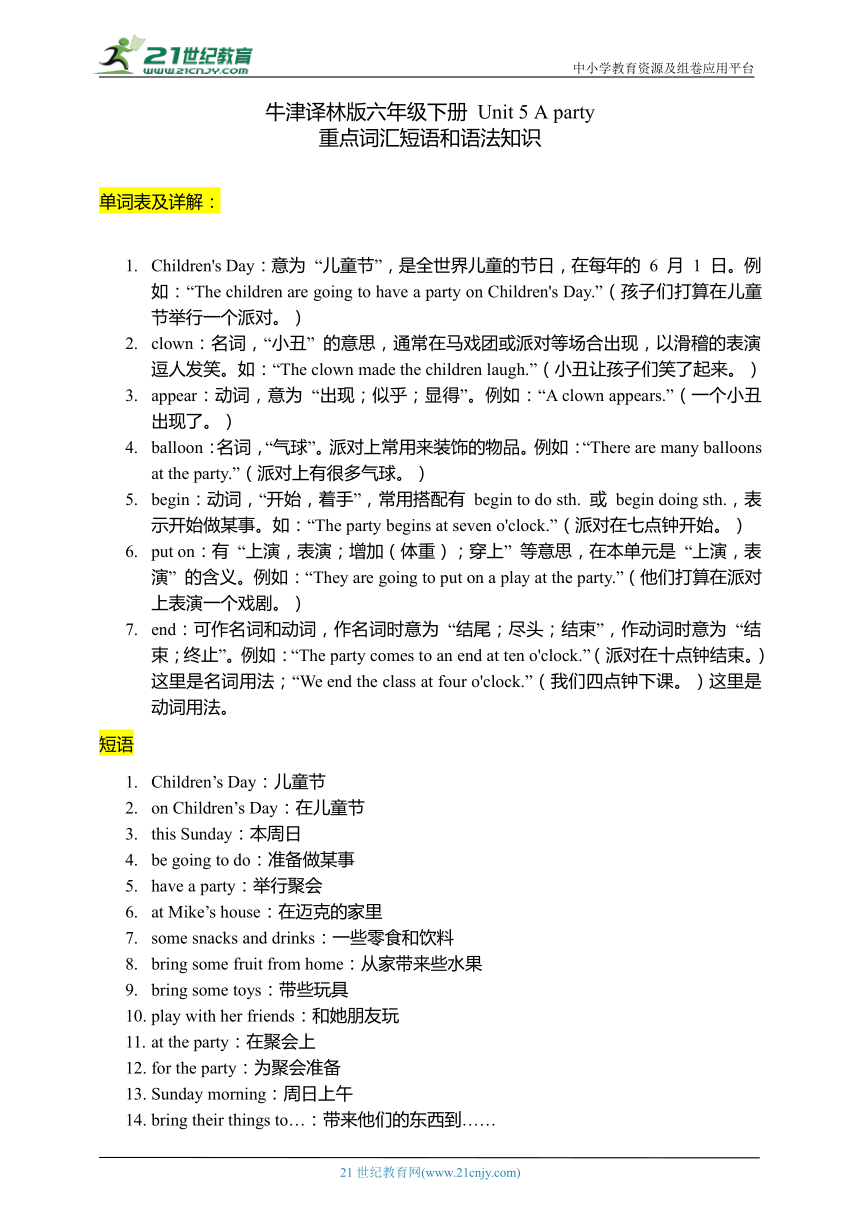
中小学教育资源及组卷应用平台 牛津译林版六年级下册 Unit 5 A party 重点词汇短语和语法知识 单词表及详解: Children's Day:意为 “儿童节”,是全世界儿童的节日,在每年的 6 月 1 日。例如:“The children are going to have a party on Children's Day.”(孩子们打算在儿童节举行一个派对。) clown:名词,“小丑” 的意思,通常在马戏团或派对等场合出现,以滑稽的表演逗人发笑。如:“The clown made the children laugh.”(小丑让孩子们笑了起来。) appear:动词,意为 “出现;似乎;显得”。例如:“A clown appears.”(一个小丑出现了。) balloon:名词,“气球”。派对上常用来装饰的物品。例如:“There are many balloons at the party.”(派对上有很多气球。) begin:动词,“开始,着手”,常用搭配有 begin to do sth. 或 begin doing sth.,表示开始做某事。如:“The party begins at seven o'clock.”(派对在七点钟开始。) put on:有 “上演,表演;增加(体重);穿上” 等意思,在本单元是 “上演,表演” 的含义。例如:“They are going to put on a play at the party.”(他们打算在派对上表演一个戏剧。) end:可作名词和动词,作名词时意为 “结尾;尽头;结束”,作动词时意为 “结束;终止”。例如:“The party comes to an end at ten o'clock.”(派对在十点钟结束。)这里是名词用法;“We end the class at four o'clock.”(我们四点钟下课。)这里是动词用法。 短语 Children’s Day:儿童节 on Children’s Day:在儿童节 this Sunday:本周日 be going to do:准备做某事 have a party:举行聚会 at Mike’s house:在迈克的家里 some snacks and drinks:一些零食和饮料 bring some fruit from home:从家带来些水果 bring some toys:带些玩具 play with her friends:和她朋友玩 at the party:在聚会上 for the party:为聚会准备 Sunday morning:周日上午 bring their things to…:带来他们的东西到…… just then:就在那时 some balloons:一些气球 play with the toys:玩玩具 have some fun:玩得愉快 look out of the window:看着窗外 at the lovely snow:看着可爱的雪 take a gift:带一个礼物 arrive too early:太早到 a few minutes late:晚几分钟 a Western party:一个西方聚会 play the piano:弹钢琴 tell a story:讲个故事 put on a play:上演一个戏剧 Class Party:班级聚会 think of:想 new clothes:新衣服 语法知识点 一般将来时 定义:表示将要发生的动作或存在的状态。 结构:“be going to + 动词原形”,主要表示计划、打算做某事,是已决定的并很可能发生的事。 时间标志词:如 tomorrow, next day (Sunday, week, month, year...), soon, the day after tomorrow (后天), in + 一段时间(in a few days)等。 句型 肯定句结构:主语 + be going to + 其他。例如:I am going to go jogging tomorrow morning. 否定句结构:主语 + be + not + going to + 其他。例如:I am not going to go jogging tomorrow morning. 一般疑问句结构:Be 动词 + 主语 + going to + 其他。注意人称和数量词的变化。 特殊疑问句结构:特殊疑问词 + 一般疑问句。用于对所做事情、时间、地点等的提问。例如:When are you going to go jogging (对时间提问),What are you going to do (对所做事情提问),Where are you going to have the party (对地点提问)等。特殊疑问词有 what(问什么),where(问地点),who(问谁),whose(问谁的),when(问时间)等。 重点句型及运用场景: “The children are going to have a party at Mike ... ...
~~ 您好,已阅读到文档的结尾了 ~~

